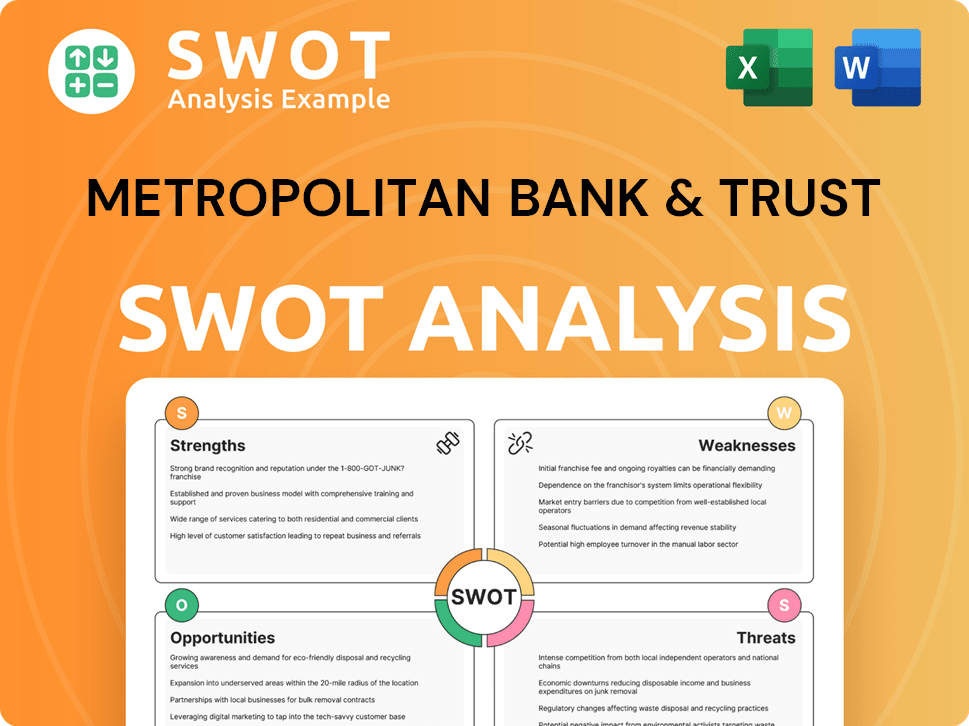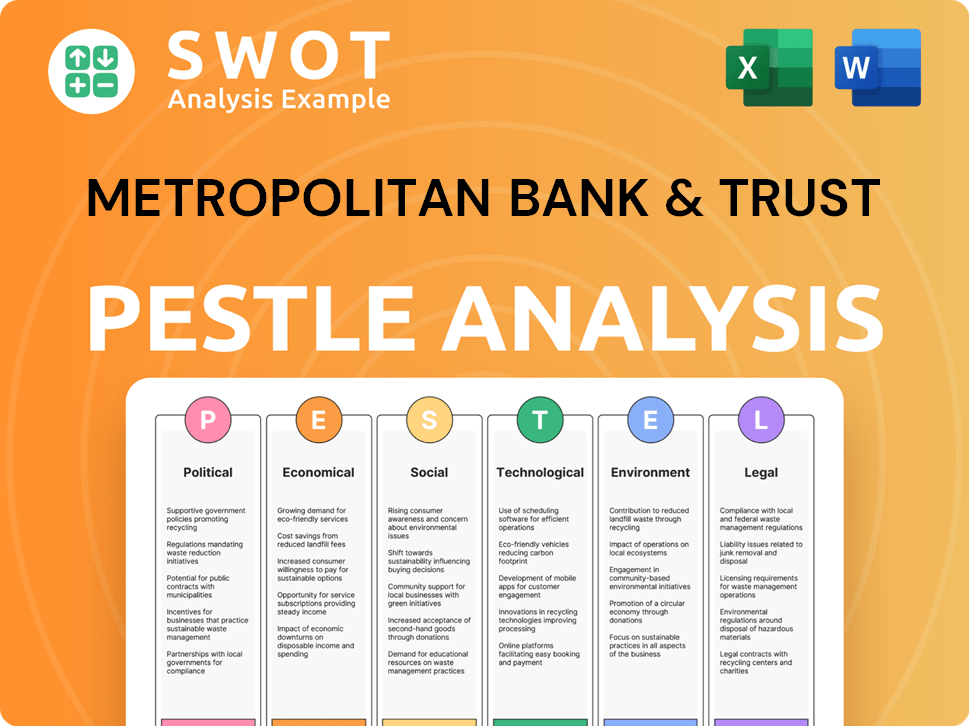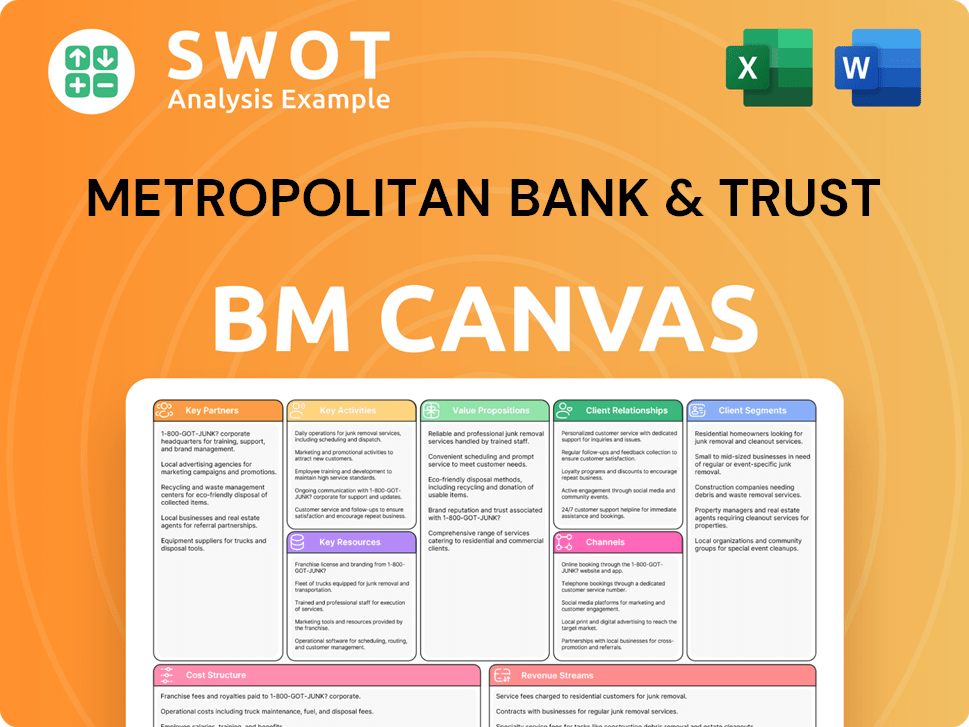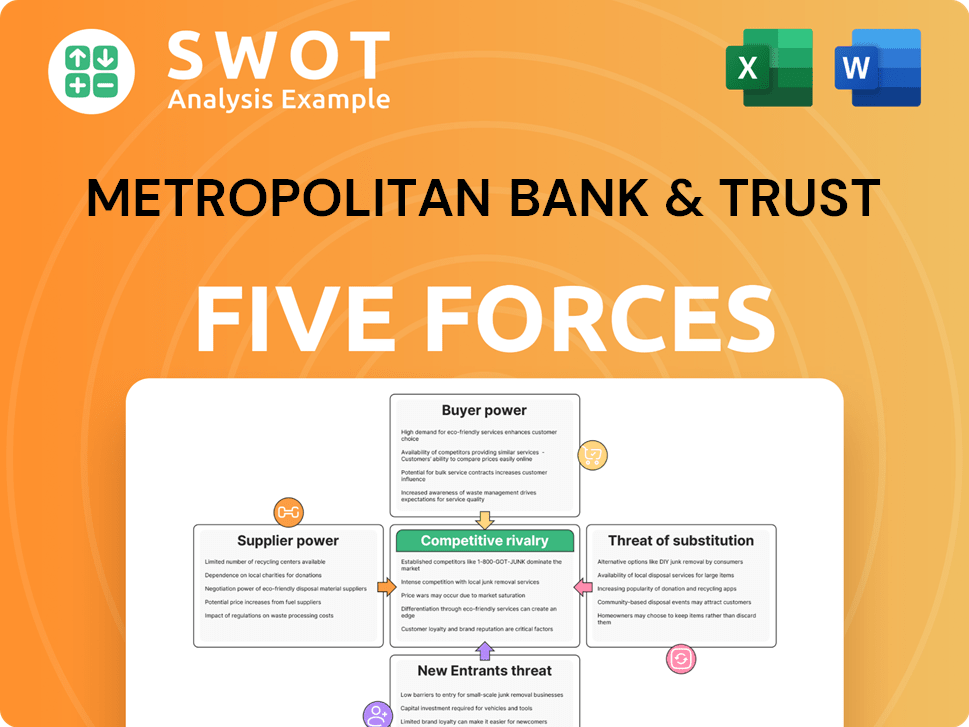Metropolitan Bank & Trust Bundle
How Did Metrobank Rise to Become a Philippine Banking Giant?
Delve into the captivating Metropolitan Bank & Trust SWOT Analysis and uncover the remarkable journey of Metropolitan Bank & Trust Company (Metrobank), a cornerstone of the Philippine financial landscape. From its inception in 1962, Metrobank's story is one of strategic vision and unwavering growth. Explore the key milestones and pivotal moments that shaped this financial powerhouse.

This article unravels the rich Metrobank history, tracing its evolution from a small bank serving the Filipino-Chinese community to the second-largest private universal Philippine bank by assets. Discover the early years of Metrobank, its expansion strategies, and the significant role it plays in the Philippine economy. Learn about the Ty family and their vision, and how Metrobank continues to adapt and innovate in the ever-changing financial world, offering a comprehensive look at this banking giant's impact.
What is the Metropolitan Bank & Trust Founding Story?
The story of Metropolitan Bank & Trust Company, often referred to as Metrobank, began on September 5, 1962. It was established by a group of Filipino businessmen, with George Ty playing a pivotal role in its founding. This marked the beginning of what would become one of the leading financial institutions in the Philippines.
The bank's first office was located in the Wellington Building in Binondo, Manila. This strategic location was chosen to serve the Filipino-Chinese community, which at the time, had limited access to banking services. This focus on a specific market segment was a key factor in Metrobank's early success.
Metrobank's initial mission was to provide banking services to the Filipino-Chinese community. The early services included essential banking functions like deposits and loans, designed to support the community's commercial activities. The bank quickly expanded, opening its first branch in Divisoria in August 1963, and its first provincial branch in Davao four years later.
- September 5, 1962: Formal establishment of Metropolitan Bank & Trust Company.
- August 1963: Opening of the first branch in Divisoria.
- Early 1960s: The Philippine economy was growing, with the Filipino-Chinese business sector gaining influence, which influenced the creation of Metrobank.
- The bank's initial focus was on core banking functions such as deposits and loans.
The early 1960s in the Philippines were characterized by economic growth and the increasing prominence of the Filipino-Chinese business sector. This context was crucial for Metrobank's creation, as it aimed to serve this dynamic segment. The bank's rapid expansion beyond its initial location demonstrated its early success and its ability to meet the needs of its target market. For more information on the current target market, you can read about the Target Market of Metropolitan Bank & Trust.
Metropolitan Bank & Trust SWOT Analysis
- Complete SWOT Breakdown
- Fully Customizable
- Editable in Excel & Word
- Professional Formatting
- Investor-Ready Format

What Drove the Early Growth of Metropolitan Bank & Trust?
The early growth and expansion of Metropolitan Bank & Trust Company, often referred to as Metrobank, marked a significant period in its development. This phase was characterized by a strategic blend of domestic expansion, international ventures, and the diversification of financial services. The bank's early moves set the stage for its future prominence in the Philippine banking sector. The Owners & Shareholders of Metropolitan Bank & Trust played a crucial role in shaping its trajectory.
Metrobank's journey began with its first branch in Divisoria in August 1963. This was followed by its initial provincial branch in Davao. The bank quickly recognized the importance of an international presence, opening its first international branch in Taipei in 1970 and a representative office in Hong Kong in 1973. By 1975, Metrobank became the first private Philippine bank to establish an office in Guam, followed by branches in Los Angeles and New York.
By September 1982, Metrobank had expanded its network to over 200 branches, offices, and subsidiaries. A year later, it achieved the distinction of being the top private domestic bank based on total resources, reaching ₱8.8 billion. The Central Bank's authorization for Metrobank to operate as a universal bank in August 1981 was a pivotal decision, allowing it to broaden its financial offerings significantly.
The universal banking license enabled Metrobank to undertake key ventures. This included acquiring majority ownership in Philippine Savings Bank (PSBank), then the second-largest savings bank in the country. Additionally, Metrobank established its own credit card company, Unibancard Corporation (now Metrobank Card Corporation), in 1986. These strategic moves, including early international expansion and diversification into various financial services, positioned Metrobank for sustained growth.
These early initiatives solidified Metrobank's standing in the competitive Philippine banking landscape. The bank's early focus on expansion and diversification laid the groundwork for its future success. Metrobank's history reflects a commitment to growth and innovation, which has contributed to its position as a leading Philippine bank. The bank's evolution highlights its adaptability and strategic vision.
Metropolitan Bank & Trust PESTLE Analysis
- Covers All 6 PESTLE Categories
- No Research Needed – Save Hours of Work
- Built by Experts, Trusted by Consultants
- Instant Download, Ready to Use
- 100% Editable, Fully Customizable

What are the key Milestones in Metropolitan Bank & Trust history?
The Metrobank history is marked by significant achievements, strategic innovations, and the navigation of various challenges, solidifying its position as a leading Philippine bank.
| Year | Milestone |
|---|---|
| 1990 | Launched the country's first talking ATM, known as Metrobank E.T., marking a technological advancement in banking services. |
| 1995 | Became the first Philippine bank to reach a total capital of Php22.8 billion, establishing itself as the largest in the industry. |
| 1988 | Formed a joint venture with Toyota Motor Corporation and Mitsui Corporation to establish Toyota Motor Philippines Corporation, expanding its business portfolio. |
| 1998 | Partnered with the AXA Group to create Philippine AXA Life Insurance Corporation, diversifying its financial services offerings. |
| 2000 | Acquired Solid Banking Corporation (Solidbank), integrating its branches and assets to strengthen its market position. |
Metrobank has consistently embraced innovation to enhance customer experience and operational efficiency. These innovations have played a crucial role in its growth.
In 1990, Metrobank introduced the country's first talking ATM, Metrobank E.T., which provided audio instructions and transaction details.
Metrobank has continuously invested in new computer systems, such as Mosaic, to speed up transactions and improve service delivery.
Despite its successes, Metrobank has faced several challenges common to the banking industry. These challenges required strategic responses to maintain and enhance its market position.
The Philippine bank industry is highly competitive, with numerous banks vying for market share, requiring Metrobank to continuously innovate and differentiate.
Economic crises, such as the Asian currency crisis in 1997, posed significant hurdles, necessitating strategic programs to sustain growth and market position.
The shift towards virtual banking and more sophisticated financial demands has required Metrobank to continuously adapt and offer differentiated products and services.
Metropolitan Bank & Trust Business Model Canvas
- Complete 9-Block Business Model Canvas
- Effortlessly Communicate Your Business Strategy
- Investor-Ready BMC Format
- 100% Editable and Customizable
- Clear and Structured Layout

What is the Timeline of Key Events for Metropolitan Bank & Trust?
The Metrobank history is marked by significant milestones, from its establishment in 1962 to its current status as a leading financial institution. The story of the bank, which began in Binondo, Manila, reflects strategic expansion and innovation. The Ty family's vision has been instrumental in shaping its trajectory, driving it to become a major player in the Philippine banking sector.
| Year | Key Event |
|---|---|
| 1962 | Metropolitan Bank & Trust Company was established on September 5 in Binondo, Manila. |
| 1963 | Opened its first local branch in Divisoria. |
| 1970 | Established its first international branch in Taipei, Taiwan. |
| 1975 | Became the first private Philippine bank to open an office in American territory (Guam), followed by Los Angeles and New York. |
| 1981 | Listed on the Philippine Stock Exchange (PSE: MBT) and granted a universal banking license. |
| 1982 | The number of Metrobank branches, offices, and subsidiaries surpasses 200. |
| 1983 | Tops all private domestic banks in total resources, reaching ₱8.8 billion. |
| 1986 | Establishes its own credit card company, Unibancard Corporation (now Metrobank Card Corporation). |
| 1988 | Enters a joint venture with Toyota Motor Philippines Corporation. |
| 1990 | Launches the country's first talking ATM, Metrobank E.T. |
| 1995 | Becomes the first billion-dollar bank in the Philippines with total capital of Php22.8 billion. |
| 2000 | Acquires Solid Banking Corporation (Solidbank). |
| 2024 | Reports a record-high net income of PHP 48.1 billion, a 14.0% increase year-on-year, with total consolidated assets reaching PHP 3.52 trillion. |
| 2025 | Reports a net income of PHP 12.253 billion for the first quarter ended March 31, 2025, with total assets reaching PHP 3.5 trillion. |
In 2024, Metrobank achieved a record-high net income of PHP 48.1 billion, reflecting a 14.0% increase year-on-year. The return on equity improved to 13.0% from 12.5% in 2023. Gross loans grew by a robust 17.0% year-on-year in 2024, surpassing industry growth.
Metrobank is focused on sustaining its growth momentum through continued investment in technology and human resources. The bank aims to be a more relevant partner in supporting the growth of local businesses and communities. Analyst predictions and leadership statements emphasize medium-term growth strategies.
The bank's strategic initiatives are expected to maintain healthy capital and liquidity positions, supporting asset expansion and enhancing shareholder returns. Total deposits rose by 8.0% to PHP 2.6 trillion in 2024, indicating strong financial health. The bank aims to empower clients to realize their goals.
Key growth drivers include significant increases in commercial loans (17.7%) and consumer loans (14.4%), including credit card receivables (18.6%) and auto loans (18.2%). Metrobank's focus on supporting local businesses and communities plays a crucial role in the nation's social and economic development.
Metropolitan Bank & Trust Porter's Five Forces Analysis
- Covers All 5 Competitive Forces in Detail
- Structured for Consultants, Students, and Founders
- 100% Editable in Microsoft Word & Excel
- Instant Digital Download – Use Immediately
- Compatible with Mac & PC – Fully Unlocked

Related Blogs
- What is Competitive Landscape of Metropolitan Bank & Trust Company?
- What is Growth Strategy and Future Prospects of Metropolitan Bank & Trust Company?
- How Does Metropolitan Bank & Trust Company Work?
- What is Sales and Marketing Strategy of Metropolitan Bank & Trust Company?
- What is Brief History of Metropolitan Bank & Trust Company?
- Who Owns Metropolitan Bank & Trust Company?
- What is Customer Demographics and Target Market of Metropolitan Bank & Trust Company?
Disclaimer
All information, articles, and product details provided on this website are for general informational and educational purposes only. We do not claim any ownership over, nor do we intend to infringe upon, any trademarks, copyrights, logos, brand names, or other intellectual property mentioned or depicted on this site. Such intellectual property remains the property of its respective owners, and any references here are made solely for identification or informational purposes, without implying any affiliation, endorsement, or partnership.
We make no representations or warranties, express or implied, regarding the accuracy, completeness, or suitability of any content or products presented. Nothing on this website should be construed as legal, tax, investment, financial, medical, or other professional advice. In addition, no part of this site—including articles or product references—constitutes a solicitation, recommendation, endorsement, advertisement, or offer to buy or sell any securities, franchises, or other financial instruments, particularly in jurisdictions where such activity would be unlawful.
All content is of a general nature and may not address the specific circumstances of any individual or entity. It is not a substitute for professional advice or services. Any actions you take based on the information provided here are strictly at your own risk. You accept full responsibility for any decisions or outcomes arising from your use of this website and agree to release us from any liability in connection with your use of, or reliance upon, the content or products found herein.